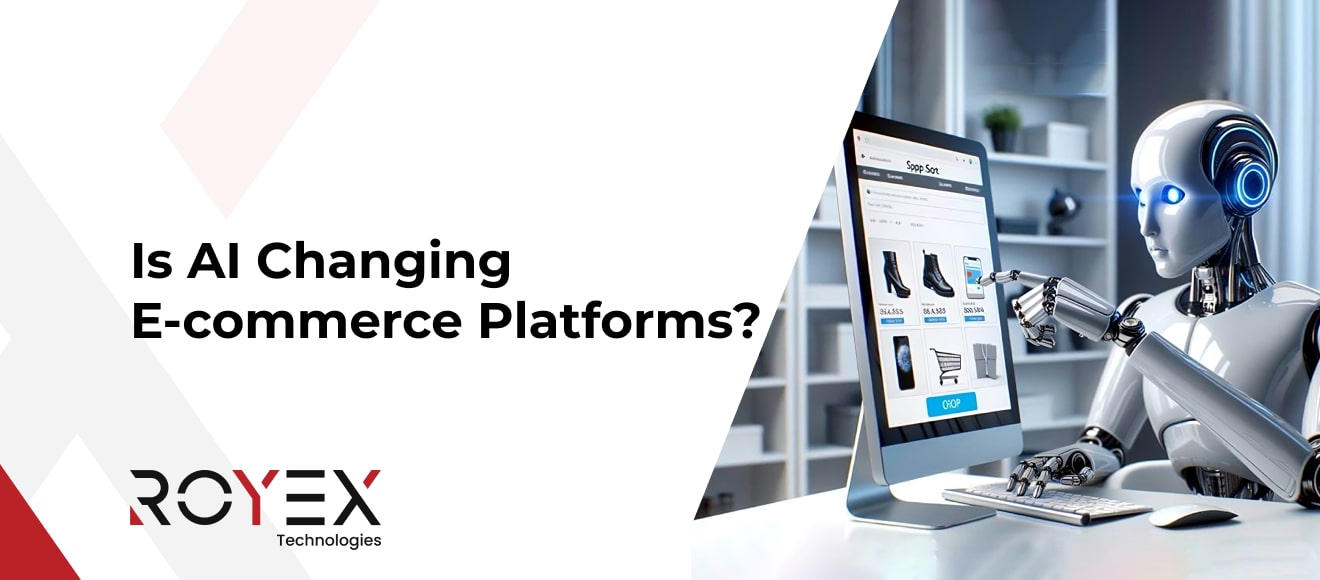
Is AI Changing E-commerce Platforms?
The e-commerce industry is evolving at lightning speed, and one of the biggest catalysts driving this transformation is Artificial Intelligence (AI). From personalized shopping experiences to predictive analytics, from AI-powered chatbots to automated inventory management, AI is reshaping the way businesses build, manage, and scale their e-commerce platforms.
In the UAE and wider Middle East region, the shift is even more pronounced. With one of the fastest-growing e-commerce markets in the world, fueled by high smartphone penetration, tech-savvy consumers, and government-led digital transformation initiatives, the integration of AI in ecommerce web design and development is no longer optional — it’s essential for survival and growth.
This article explores how AI is changing e-commerce platforms, why UAE businesses must embrace it, and what role ecommerce web design plays in creating AI-ready solutions.
1. AI in E-commerce: The Big Picture
AI is not just an add-on for e-commerce platforms; it is deeply integrated into almost every aspect of online retail operations. Some of the key areas AI is transforming include:
-
Personalization: AI helps deliver personalized product recommendations, increasing customer satisfaction and conversion rates.
-
Search Optimization: Natural Language Processing (NLP) enables AI-powered search tools that understand customer intent.
-
Inventory Management: AI forecasts demand trends and optimizes stock levels.
-
Customer Support: AI chatbots and virtual assistants provide 24/7 support.
-
Fraud Detection: AI algorithms detect unusual patterns to prevent fraud.
-
Dynamic Pricing: AI-driven pricing models adjust product prices based on demand, competition, and market trends.
For UAE businesses, where customers demand seamless digital experiences, integrating AI into ecommerce web design and development has become a competitive advantage.
2. AI and Personalization in E-commerce Platforms
Personalization is the cornerstone of modern e-commerce. AI has taken it beyond simple “You may also like” suggestions to advanced, context-aware recommendations.
How AI Delivers Personalization:
-
Analyzing customer browsing behavior and purchase history.
-
Leveraging machine learning algorithms to predict preferences.
-
Displaying dynamic content on websites tailored to each visitor.
For example, a shopper in Dubai searching for luxury abayas will receive different suggestions than a student in Sharjah browsing for affordable electronics.
Why It Matters in the UAE:
-
High disposable incomes in the UAE mean shoppers demand luxury-level experiences.
-
A culturally diverse population requires multi-layered personalization.
-
The integration of AI into ecommerce web design ensures customer journeys are tailored from homepage to checkout.
3. AI-Powered Chatbots: Revolutionizing Customer Support
One of the most visible ways AI has changed e-commerce platforms is through chatbots and virtual assistants.
Benefits of AI Chatbots:
-
24/7 Availability – Customers no longer wait for office hours.
-
Instant Responses – Handling inquiries in seconds.
-
Cost-Effective – Reducing dependence on large customer service teams.
-
Multilingual Support – Essential in the UAE, where businesses cater to both Arabic- and English-speaking customers.
Example in UAE Context:
Retail giants in Dubai already use AI-powered chatbots on WhatsApp, websites, and mobile apps to handle inquiries, recommend products, and even process purchases.
For companies investing in ecommerce web design, building AI chatbot functionality into the platform is now a standard practice.
4. AI and Search Optimization
Traditional keyword-based search is giving way to AI-powered search engines that understand natural language queries and visual search inputs.
AI Search Features:
-
Voice Search Optimization (growing with smart speakers).
-
Image Recognition Search (take a photo and find similar products).
-
Context-Aware Search Results (showing relevant items even if phrased differently).
UAE Context:
With over 90% smartphone penetration in the UAE, mobile users increasingly rely on voice and image-based searches. Incorporating AI-driven search in ecommerce web design enhances customer satisfaction and boosts conversion rates.
5. Predictive Analytics and Inventory Management
AI-powered predictive analytics allow e-commerce businesses to:
-
Forecast demand based on historical data and seasonal patterns.
-
Prevent overstocking and understocking.
-
Adjust supply chains proactively.
In the Middle East, where consumer demand fluctuates during Ramadan, Eid, and shopping festivals like Dubai Shopping Festival (DSF), AI-driven inventory management ensures businesses are ready for high-demand seasons.
6. Fraud Detection and Security
AI algorithms are highly effective in detecting fraud by analyzing unusual transaction patterns, multiple failed login attempts, or irregular purchase behaviors.
Why It’s Critical in UAE E-commerce:
-
The UAE has rapidly grown into a regional e-commerce hub, making it a target for online fraud.
-
AI integration into ecommerce web design helps secure platforms with real-time fraud detection systems.
7. Dynamic Pricing Powered by AI
AI enables businesses to adjust prices dynamically based on demand, competitor pricing, and customer behavior.
UAE-Specific Example:
During shopping festivals in Dubai, AI-driven platforms can automatically offer flash discounts to boost engagement while maintaining profitability.
For businesses investing in ecommerce web design, integrating AI pricing engines ensures they remain competitive in the fast-moving UAE retail space.
8. The Role of AI in Mobile E-commerce
Mobile commerce (m-commerce) dominates the UAE market, with over 70% of transactions happening on smartphones. AI enhances mobile e-commerce by:
-
Offering personalized push notifications.
-
Enabling voice and image-based shopping.
-
Ensuring faster checkout experiences with predictive autofill.
A seamless mobile-first ecommerce web design that integrates AI tools ensures UAE businesses meet consumer expectations.
9. AI and Marketing Automation
E-commerce businesses in the UAE use AI to:
-
Automate email campaigns with personalized content.
-
Create AI-driven ad targeting strategies.
-
Use chatbots for retargeting campaigns on WhatsApp and social media.
AI-powered marketing automation not only saves costs but also drives higher ROI in a market where digital ad spend is growing rapidly.
10. AI-Driven User Experience (UX) in Web Design
At the heart of AI’s impact is the transformation of ecommerce web design. AI tools optimize UX by:
-
Analyzing heatmaps to see how users interact with the site.
-
Providing personalized layouts based on user preferences.
-
Reducing friction in checkout processes.
For UAE shoppers accustomed to world-class retail experiences in Dubai malls, the online shopping journey must be equally intuitive and engaging.
11. The Middle East E-commerce Growth Story
Some insights into why AI adoption is critical in the UAE and Middle East:
-
The UAE’s e-commerce market is projected to exceed tens of billions in revenue in the coming years.
-
Dubai is positioning itself as a global e-commerce logistics hub.
-
Young, mobile-first consumers are driving demand for AI-powered platforms.
AI integration into ecommerce web design ensures businesses are not only keeping up but also leading in digital transformation.
12. Challenges of AI in E-commerce
While AI offers immense benefits, challenges remain:
-
High implementation costs for SMEs.
-
Data privacy concerns with customer information.
-
Need for skilled AI developers and designers.
-
Integration issues with legacy platforms.
For businesses in the UAE, partnering with a trusted development company experienced in AI-powered ecommerce web design is crucial to overcoming these challenges.
13. The Future of AI in E-commerce Platforms
Looking ahead, AI will only become more integrated into e-commerce platforms. We can expect:
-
Hyper-personalization with real-time adjustments.
-
Voice-first commerce dominating search and shopping.
-
AR and VR integration into ecommerce web design.
-
Autonomous supply chains powered by AI.
-
Emotion AI analyzing customer reactions to improve marketing and UX.
Businesses that invest in AI-ready ecommerce web design today will future-proof themselves for the digital economy of tomorrow.
Why Royex is the Best Choice for E-commerce Development in Dubai
At Royex Technologies, we understand that the future of online retail lies in AI-driven e-commerce platforms. Our expertise in ecommerce web design, AI integration, and mobile-first solutions makes us the partner of choice for businesses in Dubai and across the Middle East.
Here’s why Royex stands out:
-
Custom-Built E-commerce Solutions – Tailored to your business needs, not cookie-cutter templates.
-
AI-Integrated Platforms – From chatbots to predictive analytics.
-
SEO & Performance Optimization – Ensuring your site ranks high and loads fast.
-
Mobile-First Design – Optimized for the UAE’s mobile-driven consumer base.
-
Secure & Scalable Systems – Designed to grow with your business.
-
Local Expertise – Deep knowledge of the UAE market and consumer behavior.
With Royex, you’re not just getting a website — you’re investing in a future-ready ecommerce web design that leverages AI to maximize growth, sales, and customer satisfaction.
Conclusion
AI is not just changing e-commerce platforms — it is revolutionizing them. From personalization to predictive analytics, from fraud detection to dynamic pricing, AI is the backbone of modern ecommerce web design.
For UAE businesses, the opportunity is massive. By embracing AI-powered platforms, companies can deliver world-class shopping experiences, stay ahead of competitors, and thrive in the digital-first economy.
And with Royex Technologies as your partner in Dubai, your business will not only adapt to this change — it will lead it.





